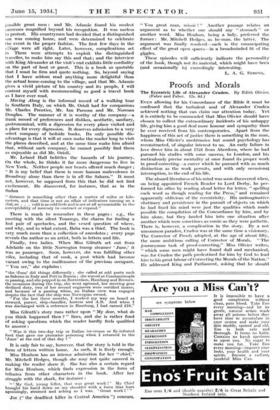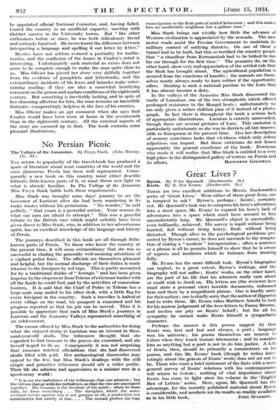Proofs and Morals
The Eccentric Life of Alexander Cruden. By Edith Olivier. (Faber and Faber. 12s. 6d.) The Eccentric Life of Alexander Cruden. By Edith Olivier. (Faber and Faber. 12s. 6d.) EVEN allowing for his Concordance of the Bible it must be confessed that the turbulent soul of Alexander Cruden achieved nothing that can claim our attention today. Yet it is entirely to be commended that Miss Olivier should have chosen to collect the extraordinary incidents of his unhappy life, giving him a good deal more honour and sympathy than he ever received from his contemporaries. Apart from the happiness of this act of justice there is something in the man, whom Miss Olivier's unobtrusive but sound psychology has reconstructed, of singular interest to us. An early failure in love drove him in about 1721 from Aberdeen, where he had pursued his studies with some success, to London, and his meticulously precise mentality at. once found its proper work in proof-correcting—a career which he pursued with as much distinction as the work permits, and with only occasional interruption, to the end of his life.
The absurd literalness of his mind was soon discovered when, on being appointed French Reader to Lord Derby, he per- formed his office by reading aloud letter for letter, "spelling each word as though reading for the Press," and remained apparently oblivious of the eccentricity. His unimaginative obstinacy and persistence in the pursuit of objects on which he had fixed his mind were just the qualities which made possible the compilation of the Concordance by him, and by him alone, but they landed him into one situation after another which were sometimes as comic as they were pathetic. There is, however, a complication in the story. By a not uncommon paradox, Cruden was at the same time a visionary. The Corrector of Proofs adopted, at the age of about fifty, the more ambitious calling of Corrector of Morals. " The journeyman task of proof-correcting," Miss Olivier writes, " which some men might have found dull and mechanical, was for Cruden the path predestined for him by God to lead him to his great labour of Correcting the Morals of the Nation." He addressed King and Parliament, asking that he should be appointed official National Corrector, and, having failed, toured the country in an unofficial capacity, meeting with distinct success in the University toxins. But " like other enthusiasts before or since, he was both ridiculously literal and seriously fanatical. He never learnt the difference between Interpreting a language and spelling it out letter by letter." . Mystics have not seldom evinced a partiality for mathe- matics, and the confusion of the issues in Cruden's mind is interesting. Unfortunately such material as exists does not seem to be complete enough to make the man quite clear to us. Miss Olivier has pieced her story very skilfully together from the evidence of pamphlets and letterbooks, and the extraordinary incidents of his loves and lunacies make enter- taining reading—if they are also a somewhat horrifying comment on the prison and asylum conditions of the eighteenth century. But something is inevitably lacking, and in spite of her charming affection for him, the man remains an incredible fantastic, exasperatingly helpless in the face of his enemies.
Miss Olivier makes an apt comment when she says that Cruden would have been more at home in the seventeenth than in the eighteenth century. All the external aspects of the story are summed up in that. The book contains some pleasant illustrations.

















































 Previous page
Previous page